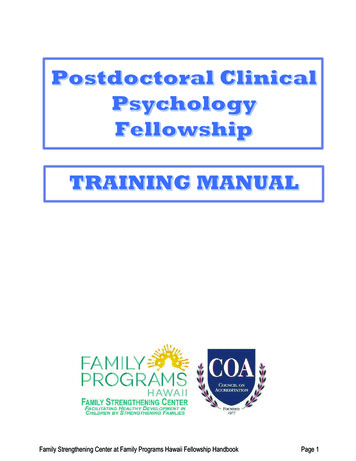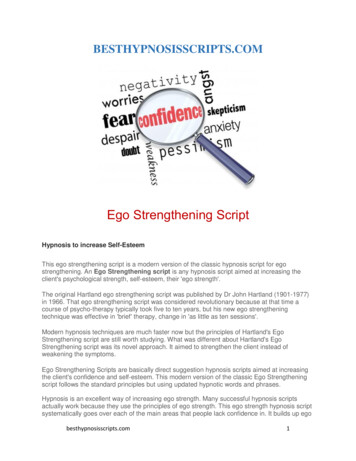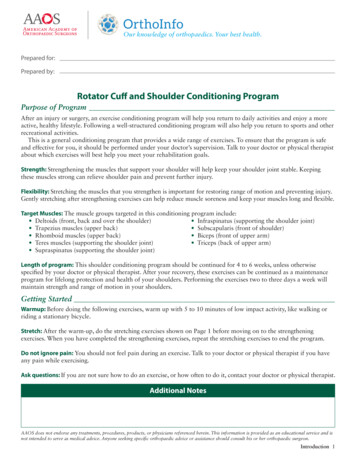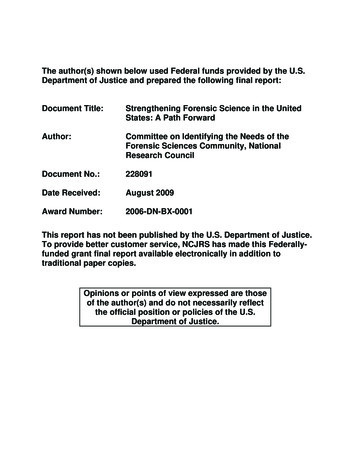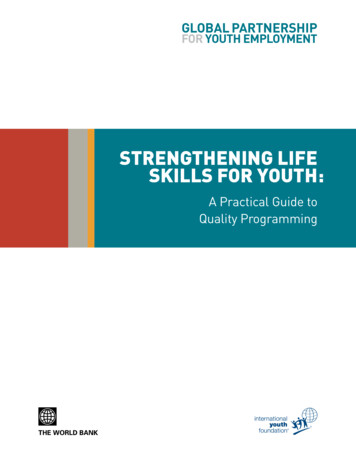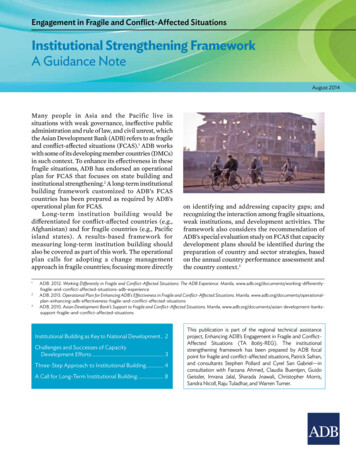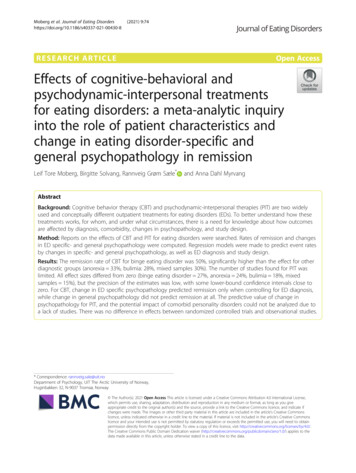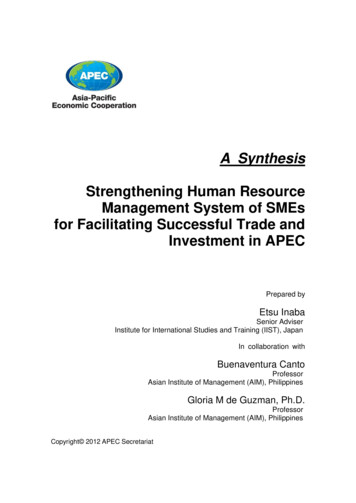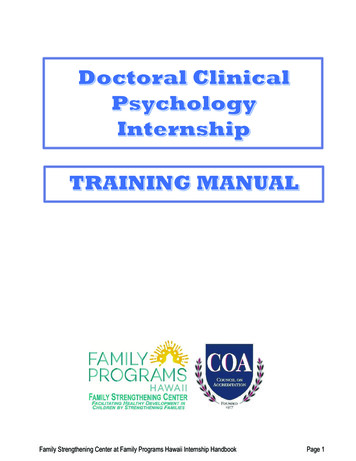
Transcription
Family Strengthening Center at Family Programs Hawaii Internship HandbookPage 1
FamilyProgramsHawaiiis a uniquenon-profit agency remaining true to its origins of,'.'\-·.\providing quality care to the children of Hawai'i. OurIgoal is that every child in Hawai'i has the opportunityFAMILVi' ,PROGRAMSto reach his or her full potential - especially childrenwho are in or may become involved in foster care. Family Programs Hawaii supports children andfamilies by providing services to prevent childrenHAWAIIfrom entering foster care, supporting children andfamilies already involved in the foster care system,and assisting youth transitioning out of foster care tosuccessfully prepare for adulthood.As of 2016,Family Programs Hawaii has served over 4,000families and children through its range of servicesand projects.The Hawai'i School of ProfessionalPsychology (HSPP) at ChaminadeThe HSPP encouragespersonalandprofessionalgrowth through faculty mentorship, engaging class s. Its programs develop psychologistswho can work to address the mental health needs oflocal populations in Hawai'i and who understand andrecognize the importance of social justice and humanOne Archer Lane. 801 S King St. Honolulu. HIOffice Telephone: (808) 282-0156 OfficeFax: (808) 521-2000Email: FSC@FamilyProgramsHawaii.orgWebsite: www.familyprogramshawaii.orgDirector: Dr. Steven J. ChoyEmail:schoy@fomilyprogramshawaii.orgCenter fees are paid through grants, slid ing scale fees, and all major health insur ances, including Quest.diversity. The clinical psychology programs preparepractitioner-scholarswhosescientific,In Affiliation with:theoreticaland practical foundations enable them to meet thechallenges of the diverse settings, populations andcommunities in which they serve.providesadvancedgraduateThe FSC at FPHschoolThe FamilyStrengtheningCenterPracticum,Internship and Post-Doctoral training in ClinicalPsychology in affiliation with HSPP.The HSPP atChaminade University's Psy.D. program is accreditedby the American Psychological Association.Center fees are paid through grants, slidingtt\lHO'OM - !1·-Creating PeaceJFV§AJ[! \It\\\ ,\111\R "CIIPCIT Trainers trained by:scale fees, and all major health insurances,including Quest.CHILDREN'S HOSPITALIn affiliation with the Hawaii School ofProfessional Psychology at ChaminadeJl§ S! ttfor children & families in needPSYCHOLOGICAL ASSESSMENTSIMPROVING outcomes for children & familie
Specialty ServicesFamily Strengthening CenterThe Family Strengthening Center at Family Programs Hawaii, inaffiliation with the Hawaii School of Professional Psychologyis a non-profit Community Mental Health Centerthat provides services to culturally, socially, and economicallydiverse children and their families. The mission of theCenter is to promote healthy development of children bystrengthening their families through a multidisci plinaryapproach. This is accomplished in collaboration with manyother organizations and agencies that address thehealthy development of children. Through the Center'smultidisciplinary staff, the Family Strengthening Centerprovides an array of services that address the developmentalneeds of children and assist their families to facilitate healthydevelopment.EVALUATIONS Comprehensive Clinical Psychological Evaluations(Infant, Child, Adolescent, and Adult)Psychological Family Risk EvaluationsDevelopmental Psychological EvaluationsFamily Systems Psychological EvaluationsMental Health AssessmentsChild Parent Relationship AssessmentsAttachment AssessmentsPsychoeducational EvaluationsDevelopmental Disabilities EvaluationForensic Psychological EvaluationsPlacement Psychological EvaluationsEXPERT COURT TESTIMONY& CONSULTATION Best Interest of the ChildAttachment IssuesPlacement Issues for ChildrenPermanency PlacementPsychological DisordersChild Maltreatment Risk Factorsand Impact of Child MaltreatmentVISITATION & TRANSITIONALSERVICES Therapeutic Child-Parent VisitationsReunification Transitional Counseling ServicesTermination of Parental Rights Counseling ServicesFamily Separation and Change of Placement CounselingServicesSUPPORT SERVICES Mentoring Support Services Supportive Services to Prevent Juvenile Incarceration Parenting Support Groups Foster Care Support Groups Support for Youth Aged-Out of Foster CareTREATMENT SERVICES Individual, Couples, Family, and Group Services(Infant, Child, Adolescent, and Adult Psychotherapy) Child Parent Psychotherapy- CPP(Evidence-Based Psychodynamic Trauma Focused Relation ship Treatment) Parent-Child Interaction Therapy- PCIT(Evidence-Based Relationship Treatment Focused onImproving Parent-Child Relationships and Child Emotionaland Behavioral Regulation Challenges) Mental Health Crisis Therapy Services Trauma Focused Cognitive Behavioral Therapy(Evidence-Based Cognitive Behavioral Therapy)TRAINING SERVICES* Practicum, Internship, and Post-Doctoral Fellowship TrainingPrograms in Clinical Psychology with Emphasis in TraumaInformed Care Social Work Practicum/Internship and Clinical Experience inTrauma Informed Care Marriage and Family Therapy Practicum Training in TraumaInformed Care Health Professionals Practicum Training in Trauma InformedCare Community Trauma Informed Care Workshops Vicarious Trauma, Compassion Fatigue, and Self-Care Training Parent-Child Interaction Therapy Training Center Child Parent Psychotherapy Training/Supervision Psychoeducational Parenting Training Child Development/Attachment Training Child Maltreatment, Interpersonal Violence, and TraumaTraining Co-Sponsor of the Annual Hawai'i International Summit onPreventing, Assessing, and Treating Trauma across theLifespanRESEARCH* Family Based Program Evaluation Family Related Research Interpersonal Trauma Related Research Child Development Research Evidence-Based Evaluation and Treatment Research Cultural and Individual Diversity ResearchTrauma Informed CareAll of our assessment and treatment services are TraurrInformed.Trauma-Informed Care is a strengths-baseframework grounded in an understanding of and responsiveneito the impact of trauma, that emphasizes physicapsychological, and emotional safety for everyone, and th,creates opportunities for survivors to rebuild a sense of contrcand empowerment.Parent-Child Interaction Therapy (PCIT)PCIT is an Evidence-Based relationship treatment progrardeveloped to treat families with children ages 2-8 who exhibbehavioral problems that are interfering with the child's healthdevelopment.The treatment is designed to improvparent-child relationships and address children's emotional anbehavioral regulation challenges. PCIT helps parents managtheir child's behaviors more effectively through building a warrand responsive relationship with their child. Research hashown that strengthening parent-child interactions results iimproved child and family functioning. The Family ProgramHawai'i Family Strengthening Center serves as a PCIT TraininCenter for Hawai'i.Group TherapyGroup therapy reduces the psychological trauma childreexperience from abuse, neglect, and separation frorparents. This program helps to develop a child's psychologic,strengths in order to facilitate healthy development. Thesservices are provided to children who have entered the chil,welfare system and have been temporarily placed at thHo'omalu O Na Kamalii shelter. The shelter keeps children safuntil they can be reunified with their parents or placed witappropriate kin or culturally similar resource caregivers in theicommunity.*Research and Training in collaboration with the Hawai'i Schoolof Professional Psychology and the Family Violence & SexualAssault Institute. Psychological services directed and supervisedby a National Register Credentialed Health Service Psychologist.
Table of ContentsChapter 1: Family Strengthening Center & Doctoral Internship Program-OverviewDoctoral Internship Program Overview . .Family Programs Hawaii Mission Statement . FSC and Doctoral Internship Program Background and Philosophy .Doctoral Internship Program’s Requirements and Responsibilities Doctoral Internship Program Ethical & Professional Obligations .Doctoral Internship Program Structure 334456Chapter 2: Doctoral Psychology Doctoral Internship Training ProgramInternship Program Activities and Purpose Doctoral Internship Program’s Goals, Objectives, & Methods .Training Resources .Overview of Training .Program Administration and Faculty Supervision and Didactic Training Selection of Doctoral Interns .Research Activities .Doctoral Intern Stipends/Training Salary .7812131314151515Chapter 3: Doctoral Interns Rights and ResponsibilitiesOverview .Intern Rights Intern Responsibilities Source of Evaluation .Outside Work .Nondiscrimination Policy .161616171818Chapter 4: Identification of Problem BehaviorDefinition of Problem Behavior 19Chapter 5: Due Process ProceduresDue Process Procedures . 22Due Process Notice 22Due Process Hearing . 22Due Process Appeal 23Chapter 6: Grievance Process ProcedureGrievance Procedures 24Grievance Appeal Procedures . 25APPENDICESAppendix A Interns Memorandum of Understanding . 26Appendix B Doctoral Internship Application Guidelines 30Appendix C Doctoral Internship Training Report . 31Appendix D Verification of Doctoral Internship Completion . 40Appendix E Verification of the Receipt for the Doctoral Internship Manual 41Appendix F Required Documents for the Completion of Doctoral Internship . 42Appendix G Doctoral Intern’s Program and Supervisor Evaluation . 43Family Strengthening Center at Family Programs Hawaii Internship HandbookPage 2
CHAPTER 1: 2020 to 2021 Family Strengthening Center at Family Programs Hawaii-OverviewMission StatementThe Doctoral Internship program at the Family Strengthening Center at Family Programs Hawaii (FSC)endorses the Family Strengthening Center’s mission statement. Our mission to facilitate healthy developmentin children by strengthening families. The FSC is a training center that develops professional competence,provide opportunity for clinical, scientific and personal growth, and foster interpersonal effectiveness.Our affiliation with the Hawaii School of Professional Psychology at Chaminade University of Honolulu alsogives us the opportunity to work with the University to instill the knowledge, skills, and ethical values ofprofessional practice, and to foster values of social responsibility in a supportive learner-centered environmentof mutual respect and professional excellence.Family Strengthening Center & Internship Program Background and Philosophy OverviewThe services that FSC provides are part of the long history of psychological services provided through theKapi’olani Child Protection Center at the Kapi’olani Medical Center for Women and Children. The Kapi’olaniChild Protection Center, an APPIC Post-Doctoral Psychology Residency member, was founded in 1987 by itsDirector, Steven J. Choy, Ph.D. The Center continued to provide psychological services as part of aMultidisciplinary Team that provided services to victims of child maltreatment and their families. Thepsychological services at the Kapi’olani Child Protection Center were eventually transferred to the HawaiiSchool of Professional Psychology at Argosy University in 2012 as part of its APPIC Doctoral Internship FSC.In 2014, the Family Strengthening Center at Family Programs Hawaii was founded and continued to be a siteunder the HSPP Doctoral Internship Consortium. The FSC continued to be a site in the HSPP DoctoralInternship Consortium until March of 2019, when Argosy University closed. Since that time, the FSC functionsas an Individual Doctoral Internship site and is an Affiliated Member of the Association of Psychology PostDoctoral and Internship Centers APPIC). The FSC Doctoral Psychology Internship program was awarded anAPPIC grant to assist in applying for APA Accreditation and submitted its Self-Study for APA review in June2021.The FSC Doctoral Internship program offers a comprehensive Doctoral Internship-training program inprofessional psychology and is designed to fulfill the clinical Doctoral Internship requirements for the doctoraldegree in clinical psychology. Because the FSC Director was the Training Director of the APPIC memberHSPP Doctoral Internship Consortium, the FSC continued to follow all of the requirements of an IndividualDoctoral Internship, site and is applying for membership as a separate independent site. The FSC as part ofthe HSPP Doctoral Internship Consortium matched with, accepted three Doctoral Intern students for the 2018to 2019 Doctoral Internship year, and continued to provide APPIC Affiliated supervised clinical psychologyDoctoral Internship Training after the closure of Argosy University to complete the current Doctoral Interns’training. During the 2019-2020 Doctoral Internship match, the Center accepted 2 Matched Interns as anAPPIC member. For the 2020-2021 Doctoral Internship, the Center accepted one matched Intern during theAPPIC Match Phase I.The Family Strengthening Center at Family Programs Hawaii specializes in working with vulnerable andculturally and individually diverse populations and grounded in Trauma Informed Care and a variety ofEvidenced Based Treatment. Under Family Programs Hawaii, a non-profit social agency, the FSC is fullyaccredited by the Counsel on Accreditation (website: www.coanet.org). The FSC serves as the training sitefor Parent-Child Interaction Therapy for the State of Hawaii, and have trained therapists in the evidencedbased Child Parent Psychotherapy. The FSC, as a Community Mental Health Center, also serves as the Stateof Hawaii Psychological Consultant on Child Maltreatment issues and provides Statewide ComprehensivePsychological evaluations for the Child Welfare Services Section (Child Protective Services) of the DepartmentFamily Strengthening Center at Family Programs Hawaii Internship HandbookPage 3
of Human Services. Furthermore, the FSC is the Mental Health Consultants for the State of Hawaii SpecialtyCourts and our Doctoral Interns and Post-Doctoral Residents participate in the courts as a member of thecourt team. The FSC has over 40 years of psychological experience in the assessment, treatment andprevention of child maltreatment. The psychological staff has also provided expert court testimony on childmaltreatment. Due to the expertise in Child Maltreatment, the FSC has attracted many student interested inpsychological training in Trauma Informed Care.The Family Strengthening Center is supported by several long-term and renewable large State of HawaiiPurchase of Services grants. Most of the grants provide statewide services. The FSC also receives grantsand donations from several private community foundations and is a credentialed service provider for most ofthe private and government fee-for-service insurance plans. Private payments are also accepted based onan income-based fee-for-services sliding scale. The FSC is also supported by training fees for professionaltraining workshops. This allows us to provide an annual Training Salary (Stipends) of 27,000 with full benefitsto include Medical/Dental/Drug/Vision plan, two weeks of Paid Time Off and 13 observed and paid holidays.Doctoral Internship Program’s Requirements and ResponsibilitiesDoctoral Internship Program’s Requirements and Responsibilities:1. The FSC is an APPIC member and participates in all phases of the APPIC Internship Match. The FSCabides by all of the APPIC membership requirement and responsibilities.2. The FSC Doctoral Internship program is managed by the Doctoral Internship Training Director, Dr. StevenJ. Choy, who is a Licensed Clinical Psychologist and also the FSC’s Executive and Clinical Director. Heis full-time at the Center, which includes his teaching responsibilities as an Associate Professor at theHawaii School of Professional Psychology at Chaminade University of Honolulu. He is onsite at the FSCand has an office at the HSPP at Chaminade University of Honolulu. The Doctoral Internship TrainingDirector also is responsible for the coordination of training and networking with each of the DoctoralInterns’ academic program and Graduate Training Director.3. In addition to the Doctoral Internship Program, the FSC is a doctoral practicum site for graduatepsychology Universities/Schools as well as a training site for Post-Doctoral PsychologyResidents/Fellows. This allows the Doctoral Interns to have experiences with trainees from differentGraduate schools and allow them to receive training and experience in supervision of the DoctoralPsychology Practicum trainee. They are have joint training experience with the FSC’s Post-DoctoralPsychology Residents/Fellows.4. The FSC has four additional Licensed Clinical Psychologists on staff and work onsite as primary andsecondary supervisors of the Doctoral Psychology Doctoral Interns. There are three 1.0 FTE equivalentClinical Psychologists, one 0.50 FTE Clinical Psychologist, in addition to the Full-Time Executive andDoctoral Internship Director. (.50 FTE is devoted to supervision of the psychology trainees). The DoctoralInterns have daily access to a Licensed Clinical Psychologist and have experience with at least twodifferent clinical supervisors during their Doctoral Internship training.5. The Intern Training Director and all of the Licensed Clinical Psychologist Faculty/Staff comprise thetraining faculty/committee and are responsible for the integrity and quality of training. This TrainingCommittee a) directs and organizes the training program and its resources at that site, b) is involved inthe selection of Doctoral Interns, c) monitors and evaluates the training program’s goals and activities atthat site, d) is responsible for documenting and maintaining the Doctoral Interns’ training records, and e)participates in weekly group supervisors and training faculty meetings.6. The FSC provides at least two hours per week of face-to-face individual supervision, and two hours perweek of group supervision for each full time Doctoral Intern by a Licensed Clinical Psychologist. TheTraining Faculty is responsible for the development and presentation of the training activities and usesguest faculty/trainers in the community to provide training in special areas of their expertise. An averageFamily Strengthening Center at Family Programs Hawaii Internship HandbookPage 4
of 2 to 4 hours of didactic training is provide through the FSC’s weekly Training Seminars.7. The Doctoral Intern will be assigned a specialty court to manage their mental health services. The DoctoralIntern will be responsible for provide psychological consultation, receive Psychological Evaluation requestand provide Intervention consultation to the Specialty Court as part of the Court Team.8. Each intern is guaranteed an annual Training Salary (Stipends) of 27,000 with fullMedical/Dental/Drug/Vision plan and two weeks of Paid Time Off with 13 observed and paid holidays. Theaverage annual Doctoral Internship training stipends in Hawaii is 27,000.Doctoral Intern Requirements and Responsibilities:1. The Doctoral Internship is a yearlong (365 days), full-time, 2000-hour training experience. Doctoral Internsand sites may adjust their schedules to meet the needs and training experience of both, but it is expectedthat Doctoral Interns will accumulate their hours based on a 40-hour week for a minimum of 50 weeks.Overtime and/or compensation time will not be grounds for leaving a Doctoral Internship in less than 52weeks. Doctoral Interns who do not document 2000 hours during the training year may petition the FSCin coordination and approval from their academic training program to continue training with the FSC untilthose hours are completed.2. Doctoral Interns must provide a minimum of 500 hours of direct client contact or approximately one-quarterof their time. This ranges from 10-15 and no more than 20 hours per week of direct client contact. Therest of the time should be spent with training experiences, supervision, report writing, case conferences,meetings, research, etc.3. Doctoral Interns must attend weekly group supervision and training seminars at the Family StrengtheningCenter at Family Programs Hawaii.4. Doctoral Interns must complete one research project that will be submitted for peer review and possibleacceptance for a paper/poster presentation at the Annual Hawaii Trauma Conference and/or any approvedconference/convention.5. Doctoral Interns must participate in a group community-service-activity related to the field of clinicalpsychology with all of the Doctoral Interns and the Post-Doctoral Residents/Fellows at the FSC.6. The Doctoral Internship year begins on September 1 and ends on August 31. Provisions can be made forDoctoral Interns who need to extend their training beyond August 31 for unforeseen reasons in order tosecure at least 2,000 hours of Doctoral Internship training. Doctoral Interns are covered byliability/malpractice insurance through the Family Strengthening Center at Family Programs Hawaii andtheir academic program for one year beginning September 1 and ends at the end of the intern’s DoctoralInternship.Doctoral Internship Program Ethical & Professional ObligationsAs an Doctoral Internship Training Program for Doctoral Interns in the field of professional psychology, it is theethical and professional responsibility of the FSC faculty, supervisors and administrating staff to ensure, to thebest of their ability, that the Doctoral Interns who complete their training programs are competent enough tocarry out their professional responsibilities in an effective and appropriate manner. It is the training staff’sobligation, not only to evaluate their intern’s competence in relevant program requirements, but also toevaluate other competence areas related to fitness for practice. This includes, but is not limited to, professionalcharacteristics such as: (a) interpersonal skills; (b) self-awareness, self-reflection and self-evaluation; (c)Family Strengthening Center at Family Programs Hawaii Internship HandbookPage 5
emotional maturity, stability and well-being; and (d) ability to resolve issues that interfere with professional andskill development. Supervisors of Doctoral Interns should not strive to advance, recommend or graduateDoctoral Interns who have cognitive, emotional, psychological, interpersonal, technical or ethical difficultiesthat may have a negative impact on the profession, future sites or the general public. Rather it is theresponsibility of the training staff to address any deficiencies through training activities, supervision, andappropriate remediation efforts. Documentation of each intern’s progress and challenges is expected.Doctoral Internship Program StructureThe Doctoral Internship Program is administratively coordinated by the Executive and Clinical Director of theFamily Strengthening Center, Steven J. Choy, Ph.D., who is a National Register Credentialed Health ServicePsychologist and Hawaii Licensed Clinical Psychologist. He is also an Associate Professor at Hawaii Schoolof Professional Psychology at Chaminade University. Dr. Choy has been licensed in the state of Hawai‘i since1977.The Doctoral Internship Program Director (IPD) is administratively responsible for the overall functioning,selection, supervision and training of Doctoral Interns. The IPD’s responsibilities include development of thetraining program, coordinating selection of Doctoral Interns, communications with APPIC (if approved forAPPIC membership), communications with each Intern’s academic program, facilitating the flow of informationto all of the intern supervisors, ongoing review of the training goals and objectives, and overseeing thedocumentation and maintenance of Doctoral Interns’ training records. The IPD provides leadership therebyassuring scheduled supervision and arranging for intern participation in the training seminars and weekly groupsupervision.Specifically, the IPD’s responsibilities include:1. Organizing the weekly didactic and supervision training seminars: The IPD arranges for weekly didacticand supervision training seminars for all of the Doctoral Interns. The IPD oversees the training seminarsand is responsible for appointing a licensed clinical psychologist(s) and guest faculty/trainers to implementthem. The IPD and the Doctoral Internship Training Committee identifies training components and didacticcontent that is included in formal presentations throughout the course of the Doctoral Internship year.These training seminars may involve presentations by members of the training staff and/or presentersinvited from the community that are experts in their field. The IPD and designated seminar leader(s) attendto scheduling, invitations, and evaluations of the presentations. Budgetary issues and honoraria foroutside speakers is the responsibility of the IPD, and the Executive Director of the FSC.2. Communications with APPIC if approved for APPIC membership: Annual information updates, registrationwith the Association of Psychology Postdoctoral and Doctoral Internship Centers (APPIC), three-yearreviews, and other necessary communications with APPIC are the responsibility of the IPD.3. Communication with the Interns’ Graduate Training Director: Formal communication with the Interns’Graduate Training Director occurs when the interns are match to and accepted by the FSC InternshipProgram, at the time of the Interns’ Performance Evaluation and if there any concerns about the Interns’performance and their ability to complete all of the required competency aims. The Intern’s GraduateTraining Director can contact the FSC Internship Director at any time to discuss the program and theIntern’s progress.4. Supervision and Training: The IPD is responsible for the administrative component of supervision (i.e.assuring that Doctoral Interns are receiving adequate supervision by their supervising ClinicalPsychologist and for coordinating the Performance Evaluation of the Doctoral Interns).Family Strengthening Center at Family Programs Hawaii Internship HandbookPage 6
5. Program Evaluation: Evaluations are conducted on a regular basis. Evaluations undertaken by theDoctoral Internship Training Committee to assure that students, supervisory staff, and participatingcommunity agencies and State of Hawaii Departments receive input in identifying concerns, providingpositive feedback for participating staff and students, and assuring the quality of training. The IPDoversees evaluation and helps communicate feedback to individuals and participatingagencies/department. The IPD also identifies areas for the improvement of the FSC Doctoral InternshipTraining Program.6. Doctoral Interns Selections: Coordination of the APPIC Doctoral Internship matching period.Family Strengthening Center at Family Programs Hawaii Internship HandbookPage 7
CHAPTER 2: DOCTORAL PSYCHOLOGY DOCTORAL INTERNSHIP TRAINING PROGRAMInternship Program Activities and PurposeThe FSC offers a comprehensive Doctoral Internship training program in professional psychology. The trainingprogram is designed to fulfill the clinical Doctoral Internship requirements for the doctoral degree in clinicalpsychology. The objective of the program is to provide a challenging and supportive training environment toprepare Doctoral Interns to function as skilled, ethical, culturally sensitive, knowledgeable and competentprofessional psychologists. A number of experienced role models assist the intern to augment his/her currentlevel of knowledge and practice skills. The intern is encouraged to explore diverse theoretical orientations andto experience a wide variety of intervention approaches. Doctoral Interns are treated as respectedpsychologists-in-training and are supported in functioning as independent and responsible clinicians.There are four main area of training for the Doctoral Interns. The FSC has a forensic psychological evaluationprogram for victims of child maltreatment and their family. Each Doctoral Intern will participate in the forensicevaluations in this program. They will also provide infant development assessment, Developmental Disabilitiesassessments and individual assessment to determine the psychological needs of toddlers, children,adolescent and adults.The FSC is also a Training and Service Center for Parent-Child Interaction Therapy and our Doctoral Internswill participate in the comprehensive PCIT training and will have PCIT family cases assigned to them. TheDoctoral Interns also participate in our intervention program, which provide individual psychotherapy servicesto toddlers, children, adolescents and adults; Family and Marital Therapy; Trauma Focused therapy anddynamic play therapy including Child Parent Psychotherapy and sand play therapy.The FSC is the Mental Health Consultant for the Family Court Specialty Courts. There are four specialtycourts in Hawaii; the Zero-To-Three Court, the Family Drug Court, the Juvenile Drug Court and the Girls Court.The Doctoral Intern participates in all of the specialty courts as managers of the FSC’s mental health servicesto the Family Specialty Courts.The Family Progra
to 2019 Doctoral Internship year, and continued to provid APPIC Affiliated supervised clinical psychology e Doctoral Internship Training after the closure of Argosy University to complete the current Doctoral Interns' training. During the 2020 2019Doctoral Interns- hip match, the Center accepted 2 Matched Interns as an APPIC member.
